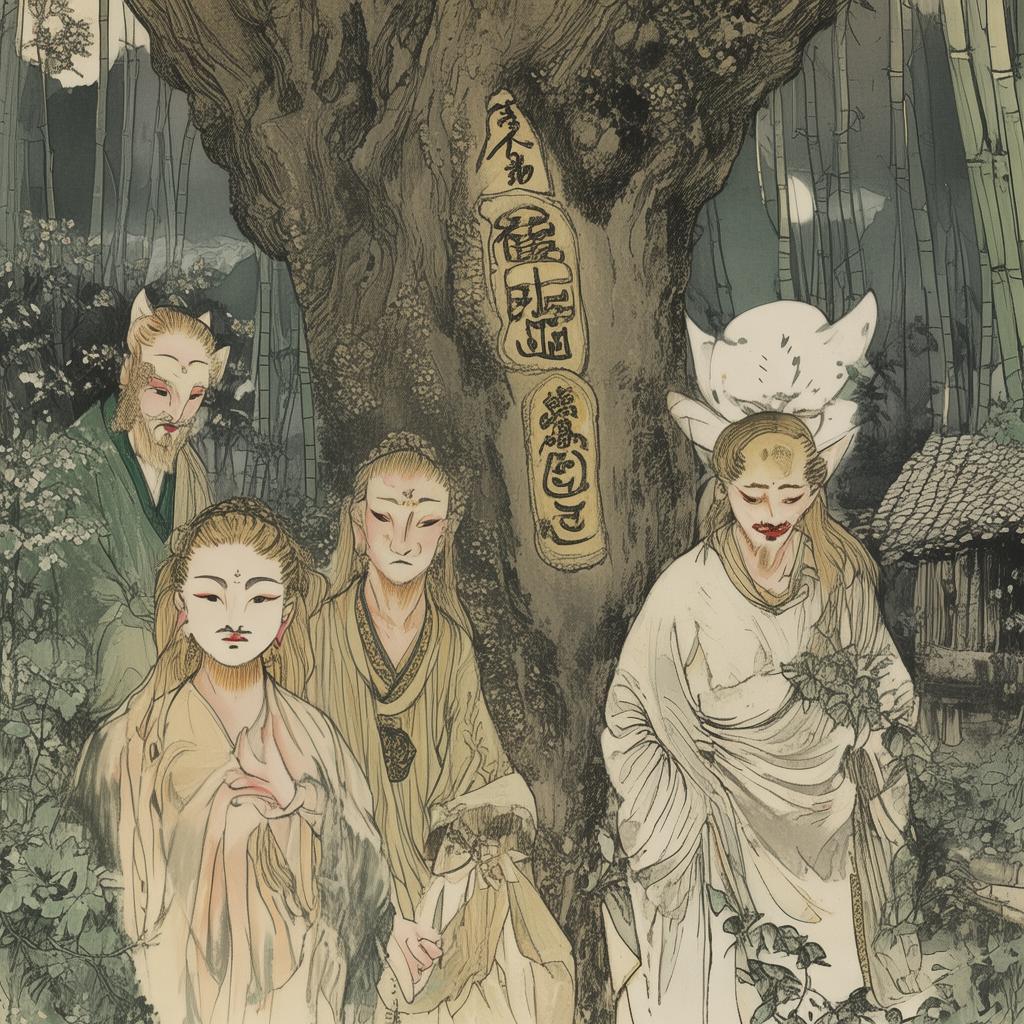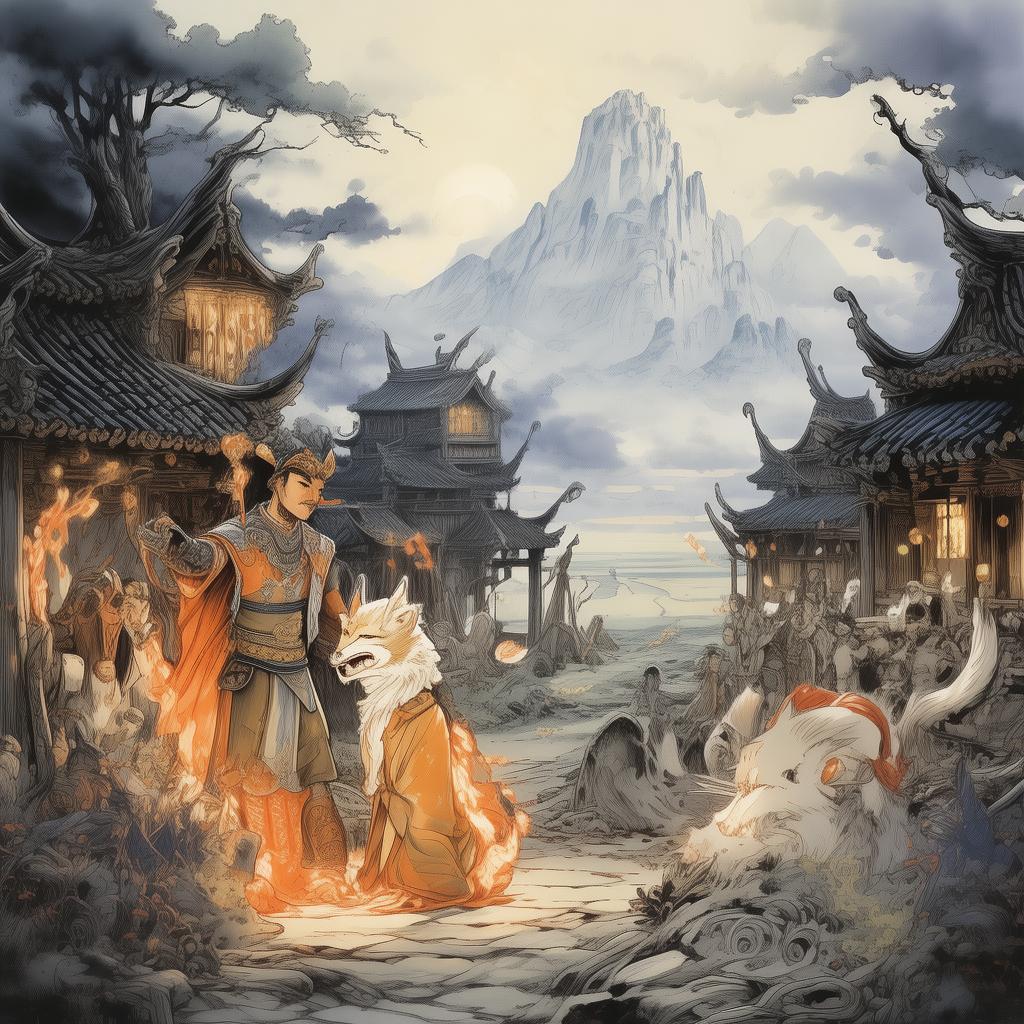Whispers of the Four Heirs
In a small, secluded village nestled between rolling hills and whispering forests, there lived a family of four siblings: Ming, Li, Hua, and Jing. They were the children of a wealthy and influential merchant, who had passed away under mysterious circumstances. The family's fortune was vast, and with it came a legacy of power and secrets.
The siblings were close, bound by the loss of their parents and the promise of their inheritance. Each of them had their own dreams and ambitions, but none could have predicted the turmoil that would soon ensue.
Ming, the oldest, was a man of great ambition and business acumen. He had always been the family's protector, ensuring that the inheritance remained secure. Li, the second born, was a gentle soul, known for her compassion and wisdom. Hua, the middle child, was a free spirit, drawn to the arts and adventure. Jing, the youngest, was a child of the earth, deeply connected to the land and its mysteries.
As the anniversary of their parents' passing approached, the siblings gathered at the ancestral home, a grand estate filled with stories and secrets. The atmosphere was tense, the air thick with unspoken words. It was here that they would learn the truth about their inheritance, a truth that would tear them apart.
The will was read by an old, trusted lawyer, who revealed that the inheritance was not to be divided equally among the siblings. Instead, it was to be split according to a set of mysterious criteria that had been written in their parents' will. The criteria were enigmatic, requiring each sibling to undergo a series of trials that would test their loyalty, courage, and integrity.
The trials began with a riddle that seemed simple on the surface but held deep, hidden meanings. Each sibling was given a scroll with a single word written on it: Trust, Loyalty, Courage, and Integrity. They were instructed to find the corresponding object in the estate that best represented each virtue.
Ming, driven by his ambition, sought the object that would secure his position as the family's leader. Li, seeking to prove her wisdom, carefully pondered each scroll, searching for the true essence of each virtue. Hua, in search of adventure, approached the task with curiosity and a love for the unknown. Jing, the child of the earth, felt a connection to the scrolls and intuitively knew which object to seek.
As they ventured through the estate, they encountered obstacles and challenges that tested their resolve. Ming found himself in a room filled with mirrors, reflecting his own ambition and the potential for his downfall. Li faced a labyrinth of shadows, representing the darkness that could consume her if she lost her way. Hua came upon a painting of a ship in a storm, symbolizing the dangers of her quest for adventure. Jing discovered an ancient well, its water shimmering with secrets and truths long forgotten.
Each sibling's journey was fraught with moral dilemmas and unexpected twists. Ming, caught in the trap of his own ambition, found himself questioning the true nature of power. Li, in her quest for wisdom, learned that loyalty was not about blind devotion but about making difficult choices. Hua, in the face of her adventure, realized that courage was not the absence of fear but the strength to face it. Jing, in her connection to the earth, understood that integrity was about living in harmony with the world around her.
As the trials progressed, the siblings began to suspect that their parents had left behind a final, ultimate test: the Four Heirs' Dilemma. They were to face a final challenge that would require them to make a choice that would either unite or destroy their family.

The challenge came in the form of a riddle spoken by their parents' ghost, which echoed through the halls of the estate. The riddle was a paradox, one that required them to choose between loyalty to their family and the greater good of the village. The siblings were torn, their loyalties tested as they grappled with the implications of their choice.
Ming, driven by his ambition, chose loyalty to the family, believing that the village's well-being was tied to their unity. Li, seeking to do what was right, chose the greater good of the village, understanding that their family's power could either enrich or destroy the community. Hua, torn between adventure and responsibility, chose to follow her heart, believing that the true strength of a family lay in its ability to adapt and change. Jing, the child of the earth, chose harmony, understanding that the village's future depended on the balance of nature and humanity.
Their choices led to a dramatic confrontation, where the siblings stood at odds with one another. Each sibling believed they were right, but the true answer lay in the understanding that their parents had left behind was not about making the "right" choice, but about facing the dilemma with courage and integrity.
In the end, the siblings realized that the true inheritance was not the wealth they sought, but the lessons they learned about themselves and their family. They came together, acknowledging the strengths and weaknesses of each other, and vowed to use their newfound wisdom to guide their future.
The story of the Four Heirs' Dilemma became a tale of loyalty, betrayal, and moral growth, passed down through generations. It served as a reminder that the true meaning of family is not in the wealth or power one inherits, but in the values and lessons learned along the way.
✨ Original Statement ✨
All articles published on this website (including but not limited to text, images, videos, and other content) are original or authorized for reposting and are protected by relevant laws. Without the explicit written permission of this website, no individual or organization may copy, modify, repost, or use the content for commercial purposes.
If you need to quote or cooperate, please contact this site for authorization. We reserve the right to pursue legal responsibility for any unauthorized use.
Hereby declared.









